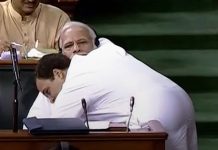
Photo: AFP
TAKING OVER as the vice-president of the Congress Party is perhaps the easiest hurdle Rahul Gandhi has had to cross. He faces far bigger ones in the next 15 months before the 2014 General Election. If anything, Rahul’s new job is the classic crown of thorns. Prime Minister Manmohan Singh’s coalition government has bled much political capital since beginning its second term in 2009 due to charges of graft, a slowing economy, rising inflation and sputtering economic reforms. The new de facto Congress leader now unenviably stares at bush fires all around him that need to be smacked down urgently. Appointed last week the torchbearer of India’s oldest political party, Rahul’s make-or-break realpolitik moment has already begun. How he deals with the dystopia will decide whether he sizzles as the sixth scion of one of the world’s most famous political dynasties and returns his party to power, or brings up its epitaph.
Threatening already to sink the Congress in Andhra Pradesh is the quagmire created by the decades-old demand for a separate Telangana state in its north. Both the Centre and the Congress party have used rounds of consultations with the warring sides to kick the can down the road. Not any more. Last month, Union Home Minister Sushil Kumar Shinde promised a Telangana solution by 28 January. Each side now confidently claims Rahul would weigh in in its favour. But this is a zero sum game and both can’t win. On 22 January, anti-Telangana Congress leaders met the prime minister and warned him yet again to not split the state. The same day, pro-Telangana Congress leaders met Shinde reminding him they expect nothing but statehood on 28 January. With Andhra Pradesh Assembly polls due concurrently with the Lok Sabha elections, the Congress is damned if it does and damned if it doesn’t. Holding as many as 31 of the state’s 42 Lok Sabha seats, Rahul can hardly expect to lose the state and keep power in New Delhi.
An even hotter potato on the Gandhi scion’s plate is Karnataka where Assembly polls are due in May and could be called earlier. The last his party won a majority here was in 1999. It stood second to the BJP in successive elections of 2004 and 2008, and has been in the Opposition since 2006 when its creaky two-year coalition government with the JD(S) collapsed. After a brief romance between the JD(S) and the BJP, too, imploded, the unprincipled politics paved the way for the BJP to win a near majority in 2008 and form the government. But five years down, the state of the BJP in Karnataka is of sordid ignominy from endless corruption and factionalism. A massive rebellion and three chief ministers later, the BJP would surprise its diehard supporters if it wins in May. But is the Congress set to gain from the BJP’s miseries?
If only. The Congress in Karnataka is riven with factionalism, most recently from the efforts of former chief minister SM Krishna, who Prime Minister Singh abruptly sacked in October as India’s foreign minister. Krishna is miffed as he was not invited to the party’s brainstorming — the Chintan Shivir — at Jaipur on 18-19 January that heralded Rahul’s formal appointment as the second-in-command to his mother, Congress President Sonia Gandhi. Then there is a battery of biggies including three current and one former union minister who are not distinguished by any camaraderie. Leading that pack is Union Minister for Petroleum and Natural Gas Veerappa Moily, also a former Karnataka chief minister and no doubt a pretender to the throne. Two other union ministers are in the fray: veteran Lok Sabha MP KH Muniyappa and Mallikarjun Kharge, who led the Congress party in Opposition in the Assembly after the 2008 debacle. Of course, collectively these sexagenarians would face no small challenge from the younger lot in the party in Karnataka, many of whom are Rahul Gandhi’s handpicks.
Similar factionalism wracks the party in Madhya Pradesh and Rajasthan where Assembly elections are due in November. In Madhya Pradesh, where it was booted from power in 2003, the Congress is catatonic and shambled. The BJP government of Chief Minister Shivraj Singh Chouhan handsomely won reelection in 2008 and has ruled without any major scandals since then. But in the Congress, factionalism is rife. Its various satraps include Chouhan’s predecessor as chief minister, Digvijaya Singh; union ministers Kamal Nath and Jyotiraditya Scindia who are both stalwarts from the state; former union minister Suresh Pachauri who headed the Congress in Madhya Pradesh during 2008-11; and Rajya Sabha MP Satyavrat Chaturvedi.
In Rajasthan, the party’s government faces anti-incumbency and, of course, factionalism. Chief Minister Ashok Gehlot has been in Sonia Gandhi’s inner circle while his arch-rival, Union Road Transport and Highways Minister CP Joshi, has been in Rahul Gandhi’s. A botched response to communal violence during his tenure brought much embarrassment to Gehlot. Joshi has been straining at the leash to get back in the state. Will Rahul be able to fend off Joshi and allow Gehlot to freely choose candidates for the elections? It is much the same story elsewhere, too. A party chief is yet to be appointed in Punjab since it lost last year’s Assembly polls. Ditto for Bihar, Haryana and Gujarat, where the BJP trounced the Congress last month. The limbo is worrisome as these states account for over 100 Lok Sabha seats.
At the party’s national headquarters at 24, Akbar Road in New Delhi, Rahul would certainly aim to bring in a fresh crop of secretaries. This, too, could ruffle feathers in the old guard, as could the changing of some of the general secretaries. Outwardly Mr Cool, Rahul has nonetheless taken a lot of heat for the Congress’ failure in last year’s Assembly polls in Uttar Pradesh, a state where he had virtually dug a stakeout. Although he is credited with installing downstream systems in a party that has been run ad hoc and whimsically for decades, Rahul now faces a Hobson’s choice: whether to adapt himself to the old-fashioned knee-jerk fixit way of running the party which he has shunned, or continue building the party ground up, which could take years to bear fruit.













